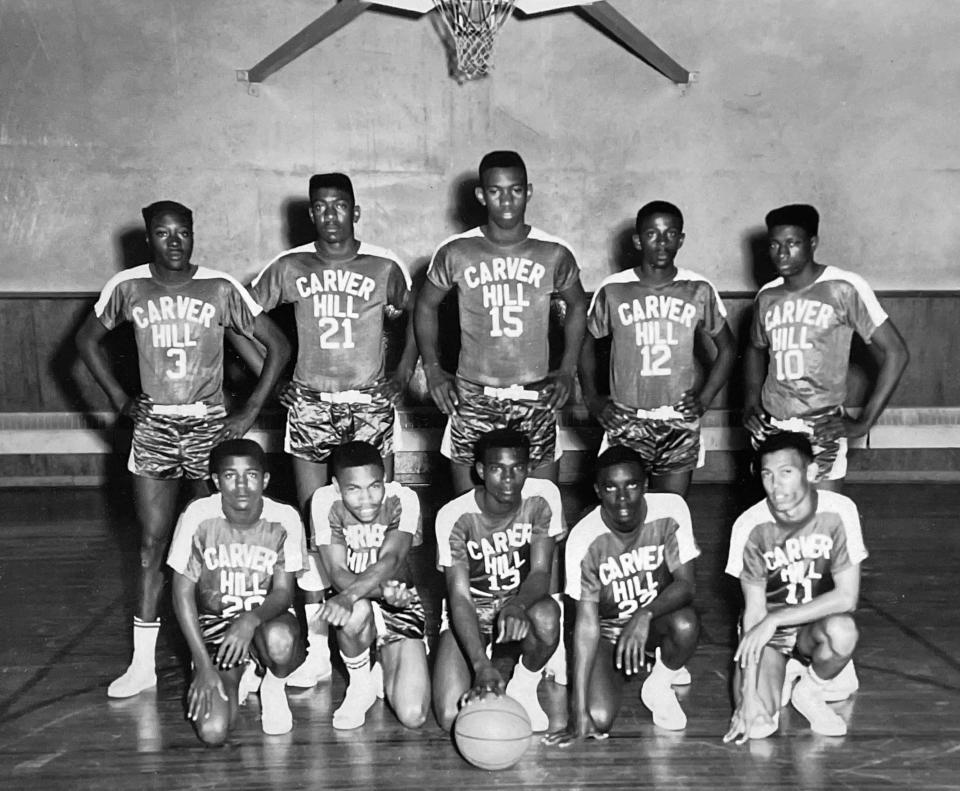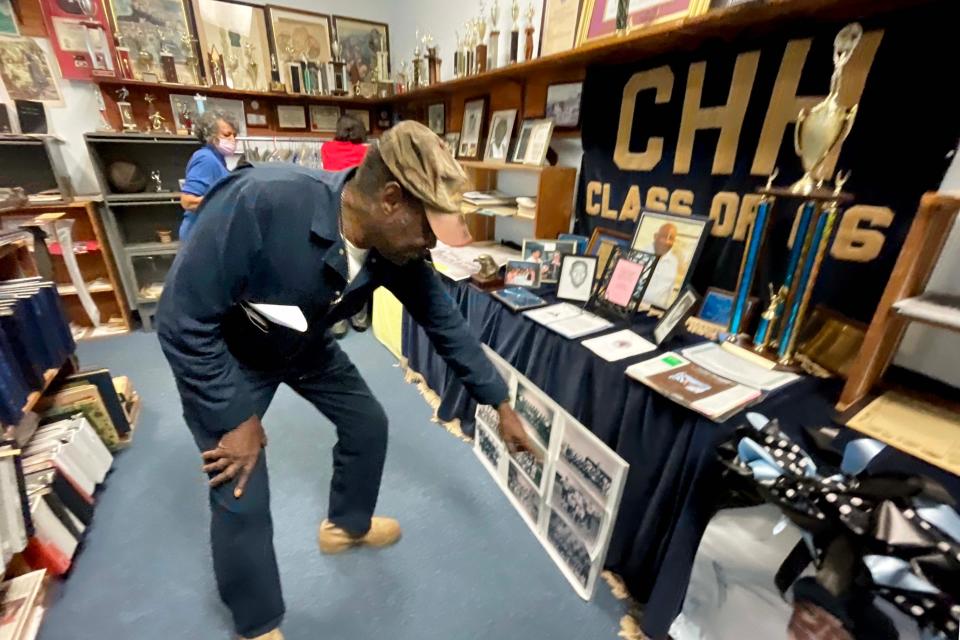'Education is foremost:' Grads from the last segregated school for Blacks in Crestview reflect on past
- Oops!Something went wrong.Please try again later.
- Oops!Something went wrong.Please try again later.
CRESTVIEW — In the only museum in Okaloosa County that emphasizes Black history, visitors can view photos of icons such as former President Barack Obama and the late world-class sprinter Houston McTear, and learn about other legendary figures such as Thurgood Marshall, who was the first Black judge on the Supreme Court.
Visitors to the Carver-Hill Museum also will be immersed in the pasts of various May Day Festival queens, band members, athletes and other students, as well as teachers and coaches who attended and worked at the old Carver-Hill High School.
It was the last operating segregated school for Blacks in Crestview.

Carver-Hill High School, the roots of which go back to the early 1900s and the historic Rosenwald School, served K-12 students from 1954 to 1966, when it closed due to desegregation. The former high school building now serves as a county School District administrative complex at 461 W. School Ave.
The existing structure for the Carver-Hill Museum was built in 1997. Its exterior features the blue and white colors of the CHHS Panthers and stands at 895 McClelland St. in Allen Park.
The museum's volunteer staff includes several former CHHS students. They include Novella Baggett, Tonsiaweda Hayes and David Wheeler, each of whom recently talked with the Daily News about their time at the school and the importance of Black History Month in February.

From 2021: PHOTOS: Crestview celebrates MLK Jr. with socially distant event
“There I am on the basketball team,” Baggett recently said at the museum while pointing to a photo of her and her friends on the school’s girls’ b-ball team. “I was also a majorette in the band.”
Baggett graduated from Carver-Hill in 1960 and returned to teach there four years later. She had created the motto, “Get prepared today for what may exist tomorrow,” for her 21-member class of 1960.
“I liked that you knew everybody,” Baggett said of the small size of her class. “It was almost like a little family.”
Wheeler, who graduated with honors in 1966, agreed. His class, which was the last to graduate from CHHS, had 17 members.

Wheeler recalled how the class of ’66 worked hard to raise money and gift the school with a luxurious curtain for its auditorium. The curtain is one of many historic memorabilia items at the museum.
“The school was central to this community,” said Wheeler, who is an Army veteran and the immediate past president of the Carver-Hill Memorial and Historical Society, which runs the museum. “It was like the nucleus. Everybody knew everybody, and the teachers who came here had some of the same experiences that we had gone through.”
Related: In 1964, Lake DeFuniak was closed to evade desegregation. After 57 years, it reopens.
Hayes, who attended most of her school years at Carver-Hill before graduating from Crestview High School, said she still has a report card from her time at Carver-Hill.
“Isn’t that sad?” she asked, laughing.
As a student, Hayes said she thought segregation “was just the way it was supposed to be. I enjoyed being with other Black students, the Black teachers, the Black preachers. Everybody in our community: That’s who you saw, that’s who you were around.”
The teachers at Carver-Hill “would tell us that’s the way it was,” Wheeler said of segregation, “but if you wanted to be more, you had to be a little more attentive academically. There was always a conversation about, 'You gotta be better. You got to be twice as good as the average person to get consideration.' ”

Wheeler said he has seen progress but would like to see greater participation by Black people in decision-making processes, including educational, political, economic and social ones, as well as in sports.
“We’ve made some strides but I think we still have a tremendous way to go,” he said.
Having Obama serve as the nation’s first Black president was a major step in making progress for the Black community, Hayes and Baggett agreed.
“We have really made a lot of accomplishments as a race of people,” Hayes said. “We have a Black female vice president, we have so many more (Black members) of the Legislature and so many more Black judges. I think our education has improved, but we never want to forget our historically Black colleges because we would never have done as well as we have without them. We still need to help people get educated. I think education is foremost.”
Baggett said Obama did not come from a wealthy family but set his goals and worked toward accomplishing them.
She recalled that when she attended and later taught at Carver-Hill, the Black community in Crestview expected all Black children to attend school and graduate.
“The kids seemed like they enjoyed being there” at Carver-Hill, she said.
“School wasn’t a deterrent,” Wheeler added.
Every graduation day was such a momentous occasion that even local area adults who didn’t have children attended the ceremonies, Baggett said.
Wheeler recalled that while he often didn’t have new and updated textbooks at Carver-Hill, he always tried to keep a positive attitude.
“Even though the books were old, the formulas (and lessons) stayed the same,” he said. “While you were giving me those (older) books, at least you were giving me something to work with.”
Some teachers at Carver-Hill disciplined mischievous students by slapping their open hand with a stick or ruler, Wheeler said.
“Nothing was said from the parents,” he said. “They were supportive” of such discipline.
Baggett remembered that the school’s classrooms didn’t have telephones when she was a student.
“If teachers had a call, they had to go all the way to the office,” she said. No student “ever ran away, nobody ever got sued for leaving the kids in the room while they went around the corner to answer the phone.”
Among other activities, museum staff members participate in the annual Dr. Martin Luther King Jr. March in Crestview and strive to host the Carver-Hill May Day Festival and Museum Day each year.
The purpose of this year’s MLK Jr. March, which was scheduled Saturday, was “for reflection and protection,” said Marcia Thomas, president of the Carver-Hill Memorial and Historical Society.
That is, for reflection of past civil rights marches and for “protection of (Blacks’) voting rights that we had to fight so hard for,” Thomas said.
The Carver-Hill Museum is open from 1-4 p.m. Tuesdays and Thursdays.
This article originally appeared on Northwest Florida Daily News: Crestview Carver-Hill museum staff, graduates reflect on segregation

